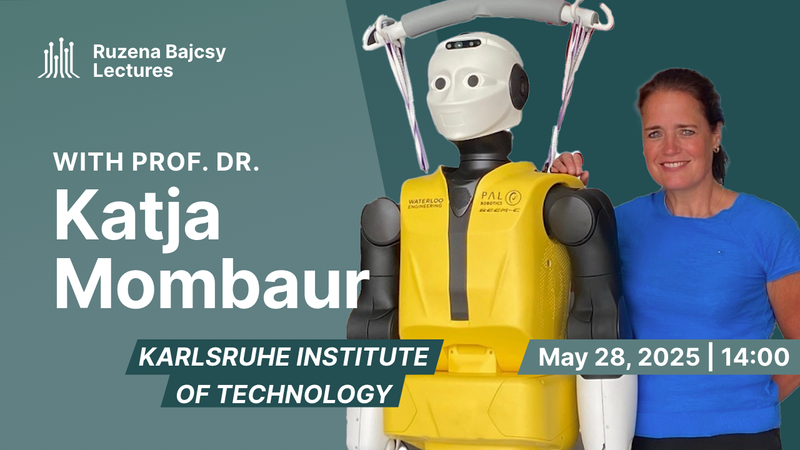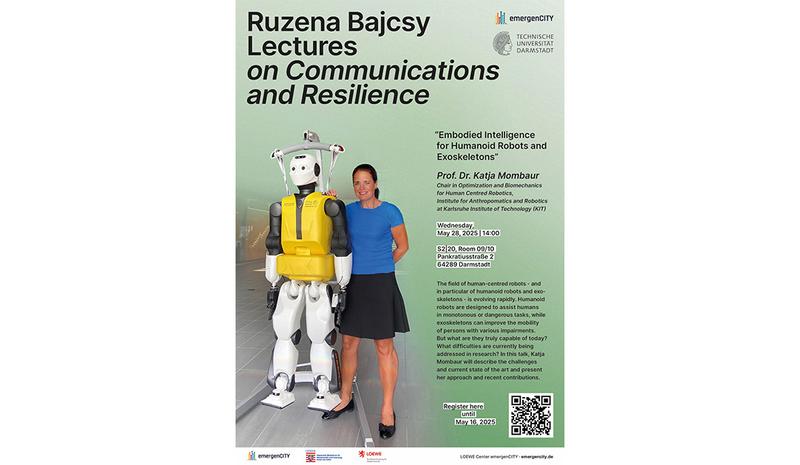Ruzena Bajcsy Lecture with Katja Mombaur
Lecture on humanoid robots and exoskeletons and presentation of the Female Student Travel Award 2025 during the emergenCITY Week
Lecture on humanoid robots and exoskeletons and presentation of the Female Student Travel Award 2025 during the emergenCITY Week

The Ruzena Bajcsy Lectures on Communication and Resilience are entering their eleventh round. Established in 2014 by the Collaborative Research Center MAKI and now taken over by emergenCITY, the lecture series honors Ruzena Bajcsy, an award-winning scientist and pioneer in electrical engineering and computer science. Every year, leading female experts are invited to give a lecture at TU Darmstadt to promote the visibility of women in this field.
This year, Katja Mombaur, Professor of Optimization and Biomechanics for Human-Centred Robotics (HCR) at the Karlsruhe Institute of Technology, will present the questions she is currently addressing in her research on humanoid robots and exoskeletons. Mombaur is working on equipping humanoid and wearable robots with motion intelligence that allows them to operate safely in a complex human world. She is investigating human movements using a combined approach of model-based optimization and experiments.
Embodied Intelligence for Humanoid Robots and Exoskeletons
Prof. Dr. Katja MombaurWednesday, May 28, 2025, 14 p. m.
S2|20, room 09/10,
Pankratiusstraße 2,
64289 DarmstadtPlease register here for the lecture until May 16th.
The one-hour lecture is traditionally followed by the presentation of the Female Student Travel Award 2025. The LOEWE Center emergenCITY, the Collaborative Research Center CROSSING, the cluster project The Third Wave of AI (3AI) of hessian.AI and the Zuse School ELIZA recognize special achievements by female students in the field of computer science, electrical engineering, information technology and artificial intelligence with this award. A stipend offers the opportunity to attend international conferences giving winters the chance to network with other female researchers in their field.
The field of human-centred robots - and in particular of humanoid robots and exoskeletons - is evolving rapidly. Humanoid robots are designed to assist humans in monotonous or dangerous tasks, while exoskeletons can improve the mobility of persons with various impairments. But what are humanoid robots and exoskeletons truly capable of today? What are the difficulties that are currently being addressed in research? Robots require embodied intelligence or motion intelligence - which goes far beyond purely computer-based AI - in order to be able to interact reliably and safely with the real world and with humans.
In this talk, Mombaur will describe the challenges and current state of the art of human-centred robotics and present her approach and recent contributions. Generating and controlling motions for whole-body humanoid robots or for exoskeletons in close interaction with the human body is very challenging due to their nonlinear dynamics with many degrees of freedom, underactuation and inherent instability. In her research, Mombaur and her team aim to gain a fundamental understanding of the biomechanics of human movement and human-human and human-robot interaction and to develop computational models at different levels of complexity.
These models are used to optimize and learn robot skills in the computer before transferring them to the real robot. Mombaur will present different examples of complex motions for human-centred robots which all require an effective coordination of the whole body and advanced stability control. This includes teaching a full size humanoid robot to walk on different terrains, balance, ride the Segway and a skateboard, manipulate and carry objects with both hands, and interact with humans at close proximity during dancing. In addition, Mombaur will show some examples of mobility assistance robots like exoskeletons and robotic rollators and the effect of different types of controllers on physical assistance as well as user comfort.

Katja Mombaur joined the Karlsruhe Institute of Technology (KIT) in Germany in 2023 as Full Professor, Chair for Optimization & Biomechanics for Human-Centred Robotics and Director of the BioRobotics Lab. In addition, she holds an affiliation with the University Waterloo in Canada where she has been Full Professor and Canada Excellence Research Chair (CERC) for Human-Centred Robotics & Machine Intelligence since 2020.
Prior to moving to Canada, she has been a Full Professor at Heidelberg University where she directed the Optimization, Robotics & Biomechanics Chair, as well as the Heidelberg Center for Motion Research. Her international experience includes two years as a visiting researcher at LAAS-CNRS in Toulouse and one year at Seoul National University. She studied Aerospace Engineering at the University of Stuttgart and SupAéro in Toulouse and holds a PhD in Mathematics from Heidelberg University.
Katja Mombaur currently serves as the Vice President for Member Activities of the IEEE Robotics & Automation Society and as Senior Editor of the IEEE Transactions on Robotics and has actively contributed to the organization of many conferences and workshops. She is the KIT Spokesperson of the Helmholtz Graduate School of Information and Data Science for Health (HIDSS4Health).
About the Ruzena Bajcsy Lectures on Commuicatins and Resilience